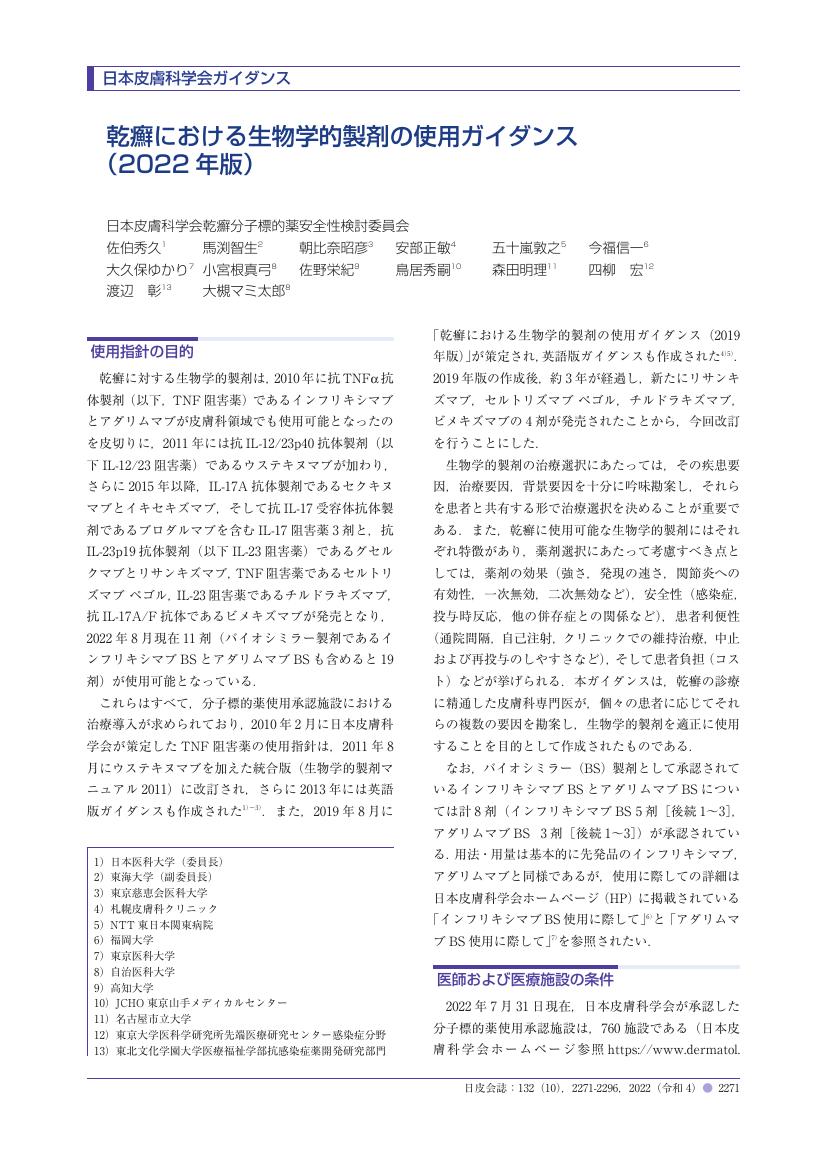6 0 0 0 OA 都市部の救命救急センターに搬送されたアナフィラキシー症例の検討
- 著者
- 小林 知子 伊藤 友章 三浦 太郎 河島 尚志 坪井 良治 大久保 ゆかり 三島 史朗 織田 順
- 出版者
- 一般社団法人 日本臨床救急医学会
- 雑誌
- 日本臨床救急医学会雑誌 (ISSN:13450581)
- 巻号頁・発行日
- vol.23, no.4, pp.525-529, 2020-08-31 (Released:2020-08-31)
- 参考文献数
- 6
目的:東京医科大学病院救命救急センターへ搬送された,アナフィラキシー患者を調べ,特徴を検討した。方法:2011年1月〜2017年3月まで,当院救命救急センターへ搬送された192例を対象とした。発生場所,重症度,治療,原因抗原を調べた。結果:アナフィラキシーの搬送数は,全搬送数の1.69%で年々増加している。自宅外での発症が58%を占め,重症度は中等症が76例(39%),重症が103例(54%)であった。被疑物質は,食物アレルギーが74.5%を占めた。皮膚科で原因抗原が確定した25例では抗原として小麦が一番多く,次にアニサキスアレルギー,甲殻類の順であった。考察:本検討では,アナフィラキシー患者は初発例が多い。再発防止のため,原因抗原の同定と指導が大切である。アナフィラキシーに対する他科との連携が大切である。結論:都心部におけるアナフィラキシー発症動向を検討し,食物アレルギーが多いことがわかった。
3 0 0 0 当科における過去3年間の掌蹠膿疱症111例の統計学的検討
- 著者
- 藤城 幹山 坪井 良治 大久保 ゆかり
- 出版者
- 公益社団法人 日本皮膚科学会
- 雑誌
- 日本皮膚科学会雑誌 (ISSN:0021499X)
- 巻号頁・発行日
- vol.125, no.9, pp.1775-1782, 2015-08-20 (Released:2015-08-20)
- 参考文献数
- 21
2010年から2012年までの3年間に当科を初診で受診した掌蹠膿疱症患者111例を統計的に検討した.結果は,男性38例,女性73例,平均発症年齢44歳,喫煙率62%,爪病変31%,骨関節症状45%,金属アレルギー14%であった.統計的に検定を行ったところ,骨関節症状は爪病変,金属アレルギーの既往,50歳未満での発症と合併率が有意に高かった.患者背景と治療効果の関係では,喫煙を継続している群,爪病変がある群,金属アレルギーの既往がある群,40歳代および40歳以上で発症した群では治療効果が有意に低いことが示された.
2 0 0 0 OA 学生はなぜ質問をしないのか?
2 0 0 0 OA 気持ちの理解における類似経験の想起の効果
- 著者
- 久保 ゆかり 無藤 隆
- 出版者
- 一般社団法人 日本教育心理学会
- 雑誌
- 教育心理学研究 (ISSN:00215015)
- 巻号頁・発行日
- vol.32, no.4, pp.296-305, 1984-12-30 (Released:2013-02-19)
- 参考文献数
- 14
- 被引用文献数
- 3
Understanding empathetically how another person feels is defined here as the making of his/her “psychological world” being i nfluenced by his/her affect. It is also assuming an inclusion predicting his/her behavior, sympathizing with him/her, and imaging an effective way of interaction with him/ her.The purposes of this study are (1) to test the hypothesis that recalling one's own experience as similar to another person's in terms of its events and internal responses facilitating an empathic understanding of how he/she feels, and (2) if recalling similar experiences facilitate in fact the empathic understanding, to examine what kind of components are cansing such an effect; one component may be arousing the same valent (positive or negative) emotion, while another retrieving similar concrete individual episodes.To accomplish these purposes, we set up three conditions: first, Gr. S, subjects were asked to remember their own experiences similar to another person's emotional experience in terms of its and internal responses; second, Gr. E, subjects were asked to remember their own experiences that were not similar to another person's in its events and internal responses, but that aroused the same valent emotion. In the third condition, Gr. G, subjects were not instructed to remember any experiences, but they were taught how to grasp gists of a story. After receiving manipulations, subjects had to Iisten to the story of a child having lost his/her littlebird1; then, subjects had to answer a questionnalre.In the first experiment, 74 third graders (40 boys and 34 girls) were divided into three groups homogeneous by made according to their intellectual ability by their teachers. Each group received manipulations collectively. The empathic understanding score of Gr. S was significantly higher than that of Gr. E and Gr. G. This result confirmed the hypothesis; still, which component caused the effect conld not be examined, because a considerable number of subjects in Gr. E and Gr. G spontaneously remembered similar experiences.In the second experiment, 77 third graders (38 boys and 39 girls) were divided into three homogeneous groups on the basis of vocabulary test scores and reading ability scores rated by teachers. They received more stringent manipulations in small groups consisting of five to seven subjects. As a result, the rates of subjects in Gr. E and Gr. G who spontaneously remembered similar experiences showed a decrease of about 30 per cent. The empathic understanding score of Gr. S was significantly higher than that of Gr. E and Gr. G. The result of the first experiment was confirmed. When Gr. S were compared with modified Gr. E and Gr. G where subjects who spontaneously remembered similar experiences were excluded, the empathic understanding of Gr. S scored the highest of all three groups while that of modified Gr. E proved significantly higher than that of Gr. G.Overall results confirmed the hypothesis that recalling experiences similar to another person's facilitates the empathic understanding of how he/ she feels. Moreover such results suggest that the effect of recalling similar experiences is caused not only by an arousing of the same valent emotion but also by retrieving similar concrete and individual episodes.
2 0 0 0 OA 乾癬における生物学的製剤の使用ガイダンス(2022年版)
2 0 0 0 OA 掌蹠膿疱症診療の手引き2022
- 著者
- 日本皮膚科学会掌蹠膿疱症診療の手引き策定委員会 照井 正 小林 里実 山本 俊幸 大久保 ゆかり 阿部 名美子 井汲 菜摘 石井 まどか 伊藤 明子 梅澤 慶紀 金蔵 拓郎 川上 洋 岸部 麻里 黒木 香奈 車谷 紋乃 河野 通良 清水 忠道 辻 成佳 十一 英子 中村 元樹 西田 絵美 葉山 惟大 平野 宏文 藤澤 大輔 藤城 幹山 藤田 英樹 松本 由香 森田 明理 村上 正基
- 出版者
- 公益社団法人 日本皮膚科学会
- 雑誌
- 日本皮膚科学会雑誌 (ISSN:0021499X)
- 巻号頁・発行日
- vol.132, no.9, pp.2055-2113, 2022-08-20 (Released:2022-08-23)
- 参考文献数
- 384
2 0 0 0 OA 幼児期における感情表出についての認識の発達 : 5歳から6歳への変化
- 著者
- 久保 ゆかり クボ ユカリ Yukari KUBO
- 出版者
- 東洋大学社会学部
- 雑誌
- 東洋大学社会学部紀要 = The Bulletin of Faculty of Sociology,Toyo University (ISSN:04959892)
- 巻号頁・発行日
- vol.44, no.2, pp.89-105, 2007-02
2 0 0 0 IR 幼児期における<けんか>への対処についての認識の発達:5歳時から6歳時への変化の多様性
- 著者
- 久保 ゆかり クボ ユカリ Yukari KUBO
- 出版者
- 東洋大学社会学部
- 雑誌
- 東洋大学社会学部紀要 (ISSN:04959892)
- 巻号頁・発行日
- vol.43, no.2, pp.97-112, 2006-02
1 0 0 0 緑豆もやしによるアレルギーの2例
- 著者
- 小林 知子 伊藤 友章 瀬下 治孝 江草 智津 原田 和俊 大久保 ゆかり 新妻 知行
- 出版者
- 一般社団法人 日本アレルギー学会
- 雑誌
- アレルギー (ISSN:00214884)
- 巻号頁・発行日
- vol.72, no.8, pp.1046-1050, 2023 (Released:2023-09-20)
- 参考文献数
- 8
症例1は10代女性.6歳から緑豆もやしを食べると口唇の腫脹と口腔内違和感が出現.症例2は20代男性.もやしラーメンを食べたあとにアナフィラキシーショックで当院救命救急センターへ搬送された.2症例ともprick-to-prick testで緑豆もやしに陽性をしめした.さらに症例2は大豆もやしにも陽性となった.また2症例で,バラ科果実でprick-to-prick test施行したところ陽性をしめし,シラカンバ,Gly m4,Bet v1に対する特異的IgEが陽性であった.緑豆もやしは,Vig r1のアレルゲンコンポーネントをもつため,PR-10ファミリーに属す.本邦では緑豆もやしを常食しているが,アレルギーの報告が少ない.しかし,シラカンバアレルギー患者で交差の可能性がある場合は,適切に検査したうえで緑豆もやしアレルギーと診断し,アレルギー専門医はpollen-food allergy syndrome(PFAS)について詳細な食事指導する必要がある.
1 0 0 0 OA 他者理解の発達再考―直感的他者理解をめぐるASD(自閉症スペクトラム)研究を通して―
- 著者
- 久保 ゆかり
- 出版者
- 東洋大学人間科学総合研究所
- 雑誌
- 東洋大学人間科学総合研究所紀要 = The Bulletin of the Institute of Human Sciences,Toyo University (ISSN:13492276)
- 巻号頁・発行日
- vol.21, pp.133-151, 2019-03
This paper first presents an overview of the typical development of social understanding in early childhood, followed by a review of ASD (autism spectrum disorders) research on social understanding that demonstrates children with ASD have difficulty not with propositional (explicit) mentalizing but with intuitive (implicit) mentalizing. It implies intuitive mentalizing itself is essential for interpersonal understanding in daily life. Based on the implications of ASD research, developmental processes of social understanding in early childhood are reconsidered, and directions for future research on children’s social understanding is discussed.
1 0 0 0 OA <けんか>についての認識の発達の多様性:幼児期3年間の縦断的研究
本研究では、幼児期3年間において〈けんか〉への対処についての認識がどのように変化していくのかについて、4歳時点からインタビューを実施し、1年後、2年後を追い、発達的変化を検討した。その結果、〈けんか〉への対処についての認識の発達の経路としては、2つあることが示唆された。一つ目は、自己抑制的で定型的な対処から、自他の要求を踏まえた交渉へと変化する経路であり、二つ目は、4歳から6歳まで、自己抑制的で定型的な対処について捉え続けるという経路であった。さらに、その2つ以外の経路の存在を示唆する事例が見出された。そこから、〈けんか〉への対処についての認識の成長の仕方には、多様な経路のあることが示唆される。

